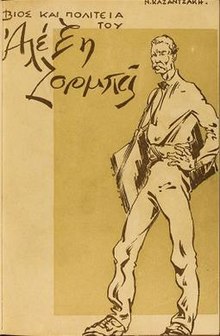Alexis Zorbas

First edition
|
|
| Author | Nikos Kazantzakis |
|---|---|
| Original title | Βίος και Πολιτεία του Αλέξη Ζορμπά (Life and Times of Alexis Zorbas) |
| Country | Greece |
| Language | Greek |
| Published | 1946 (Greek) |
| OCLC | 35223018 |
| 889/.332 20 | |
| LC Class | PA5610.K39 V5613 1996 |
Zorba the Greek (Βίος και Πολιτεία του Αλέξη Ζορμπά Víos ke Politía tou Aléxi Zorbá, Life and Times of Alexis Zorbas) is a novel written by the Cretan author Nikos Kazantzakis, first published in 1946. It is the tale of a young Greek intellectual who ventures to escape his bookish life with the aid of the boisterous and mysterious Alexis Zorba. The novel was adapted into a successful 1964 film of the same name by Michael Cacoyannis as well as a 1968 musical, Zorba.
The book opens in a café in Piraeus, just before dawn on a gusty autumn morning. The year is most likely 1916. The narrator, a young Greek intellectual, resolves to set aside his books for a few months after being stung by the parting words of a friend, Stavridakis, who has left for the Russian Caucasus to help some Pontic Greeks (in that region often referred to as Caucasus Greeks) who are being persecuted. He sets off for Crete to re-open a disused lignite mine and immerse himself in the world of peasants and working-class people.
He is about to begin reading his copy of Dante's Divine Comedy when he feels he is being watched; he turns around and sees a man of around sixty peering at him through the glass door. The man enters and immediately approaches him to ask for work. He claims expertise as a chef, a miner, and player of the santuri, or cimbalom, and introduces himself as Alexis Zorba, a Greek born in Romania. The narrator is fascinated by Zorba's lascivious opinions and expressive manner and decides to employ him as a foreman. On their way to Crete, they talk on a great number of subjects, and Zorba's soliloquies set the tone for a large part of the book.
On arrival, they reject the hospitality of Anagnostis and Kondomanolious the café-owner, and on Zorba's suggestion make their way to Madame Hortense's hotel, which is nothing more than a row of old bathing-huts. They are forced by circumstances to share a bathing-hut. The narrator spends Sunday roaming the island, the landscape of which reminds him of "good prose, carefully ordered, sober… powerful and restrained" and reads Dante. On returning to the hotel for dinner, the pair invite Madame Hortense to their table and get her to talk about her past as a courtesan. Zorba gives her the pet-name "Bouboulina" (likely inspired by the Greek heroine).
...
Wikipedia
